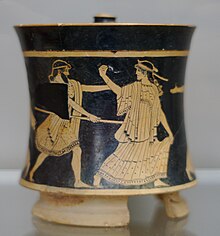Aegina
Jump to navigation
Jump to search
English[edit]

Etymology[edit]
From Ancient Greek Αἴγινα (Aígina).
Pronunciation[edit]
Proper noun[edit]
Aegina
- (Greek mythology) A nymph of the island that bears her name.
- (astronomy) 91 Aegina, a main belt asteroid.
- An island in Greece.
Derived terms[edit]
Translations[edit]
island
Anagrams[edit]
Latin[edit]
Etymology[edit]
Borrowed from Ancient Greek Αἴγινα (Aígina).
Pronunciation[edit]
- (Classical) IPA(key): /ae̯ˈɡiː.na/, [äe̯ˈɡiːnä]
- (modern Italianate Ecclesiastical) IPA(key): /eˈd͡ʒi.na/, [eˈd͡ʒiːnä]
Proper noun[edit]
Aegīna f sg (genitive Aegīnae); first declension
Declension[edit]
First-declension noun, singular only.
| Case | Singular |
|---|---|
| Nominative | Aegīna |
| Genitive | Aegīnae |
| Dative | Aegīnae |
| Accusative | Aegīnam |
| Ablative | Aegīnā |
| Vocative | Aegīna |
Related terms[edit]
References[edit]
- “Aegina”, in Charlton T. Lewis and Charles Short (1879) A Latin Dictionary, Oxford: Clarendon Press
- Aegina in Gaffiot, Félix (1934) Dictionnaire illustré latin-français, Hachette.
- “Aegina”, in William Smith, editor (1854, 1857), A Dictionary of Greek and Roman Geography, volume 1 & 2, London: Walton and Maberly
Categories:
- English terms derived from Ancient Greek
- English 3-syllable words
- English terms with IPA pronunciation
- English lemmas
- English proper nouns
- English uncountable nouns
- en:Greek deities
- en:Astronomy
- en:Islands
- en:Places in Greece
- en:Asteroids
- Latin terms borrowed from Ancient Greek
- Latin terms derived from Ancient Greek
- Latin 3-syllable words
- Latin terms with IPA pronunciation
- Latin lemmas
- Latin proper nouns
- Latin first declension nouns
- Latin feminine nouns in the first declension
- Latin feminine nouns
- la:Greece
- la:Islands
